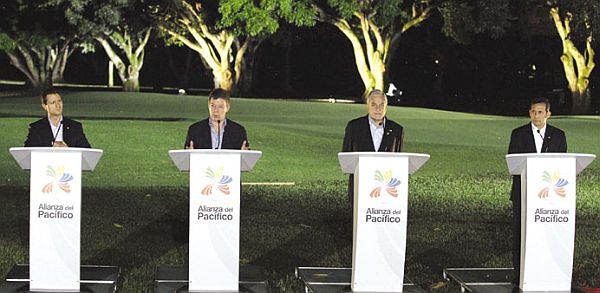Bogota, Colombia — A Latin American bloc that includes Colombia, Mexico, Peru and Chile on Thursday agreed to eliminate tariffs on most goods to promote free trade between the countries and increase exports to Asia.
The members of the nascent Pacific Alliance group also aim to promote free market policies as the key to economic growth, attract more foreign investment and integrate their capital markets and energy networks.
At a meeting in the city of Cali, Colombia, the presidents of the four member countries agreed to remove tariffs on 90 percent of the goods traded between them, and to eliminate duties on the remaining 10 percent in the medium term.
The tariffs will be lifted in July, Colombia's President Juan Manuel Santos told a press conference after the summit.
"The door to our destiny is the construction of an area of deep integration that will allow us to become part of the global economy more successfully and more forcefully - particularly in the Asia Pacific region," Santos told reporters.
The cluster of nations includes some of Latin America's fastest-growing economies. They have a combined population of 210 million and their total gross domestic product accounts for more than a third of Latin America's GDP, said Santos, dubbing the Alliance the "new economic and development motor" of the region.
Latin America is broadly divided between the Pacific countries that are free-trade advocates, and the Mercosur states on the Atlantic side that have been more reluctant to drop barriers to trade.
Robust economic growth, high commodity prices and explosive domestic demand have lured high levels of capital to much of Latin America in the past decade.
According to the United Nations, the region's economy is seen growing 3.5 percent this year, up from 3 percent in 2012, boosted by strong growth in Brazil and Argentina, surging domestic demand, as well as agriculture and investment.
However, the shaky global scenario, characterized by persistent uncertainty and low growth, will likely dampen demand for commodities produced in Latin America. Many countries in the region, whose exports include soy, copper and oil, are dependent on avid Chinese demand for products.
Mesh of Blocs
Despite recent moves by Latin American nations toward "regional integration," there are bitter internal differences over trade policy.
The Pacific Alliance will aim to gain more clout in Latin America by promoting free trade and focusing on fast-growing Asian economies as an alternative to the protectionist policies championed by Mercosur members such as Argentina and Venezuela.
Even though it is only a year old, the Pacific Alliance seems to be gaining momentum. Costa Rica, Panama and Guatemala have already expressed a desire to become members.
The group's progress may be helped by the death of Venezuelan President Hugo Chavez, who spearheaded a batch of leftist nations that rejected US "imperialism" and free trade.
His death in March after a long battle with cancer left Latin America without one of its most influential presidents, leading to a power vacuum that could be filled by more pragmatic leaders.


